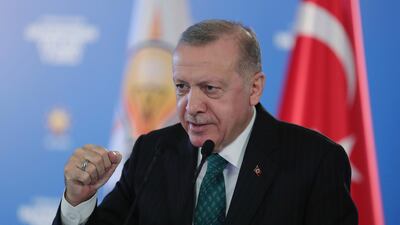A suggestion by Turkish President Recep Tayyip Erdogan for work to begin on a new constitution stirred fears for the country's democratic safeguards.
Turkey's last constitutional changes three years ago resulted in the end of parliamentary democracy and the concentration of power in Mr Erdogan's hands under an executive presidency.
“Perhaps the time has come for Turkey to once again discuss a new constitution,” the president said on Monday. “If we reach an understanding with our alliance partner, we may mobilise for a new constitution in the coming period.”
As Mr Erdogan spoke, police in Istanbul were arresting scores of students protesting in Istanbul over the presidential appointment of a university rector from the ruling party, highlighting Mr Erdogan's growing reach and the fragility of the rule of law in Turkey.
While not providing details on possible constitutional changes, Mr Erdogan said they were necessary to remove traces of “military tutelage” in the current charter, which dates to the junta of the 1980s.
The idea of a new constitution puzzled many observers, given Mr Erdogan is now able to govern by presidential decree.
“This is a populist’s strategy but usually it’s done in the first term, you don’t do it after being in power for 19 years,” said Berk Esen, assistant professor of political science at Istanbul’s Sabanci University.
“What’s the gain? Erdogan controls the economy, the army, the political system, the bureaucracy, there’s no institution that Erdogan doesn’t control, so I don’t know what a new constitution brings to the table.”
Critics claimed Mr Erdogan enjoys powers that have eroded judicial independence and the separation of powers. The system also allows a president to retain leadership of a political party for the first time, removing the office’s previous impartiality.
The government and its supporters said the system improves decision-making and provides clear direction.
Hints of constitutional change echo Mr Erdogan’s promises at the end of last year for judicial and democratic reform as Ankara faced international isolation and an economic crisis compounded by the coronavirus pandemic.
Coupled with recent economic and diplomatic pivots, this reform agenda is “the most important but also the most difficult” for the government to achieve, according to Ozgur Unluhisarcikli, director of the German Marshall Fund think tank in Ankara.
As Mr Erdogan seeks to manoeuvre, however, his alliance with the Nationalist Movement Party (MHP) is proving to be a hindrance, he said.
The ruling Justice and Development Party (AKP) has been allied to Devlet Bahceli’s MHP since the latter backed calls for the presidential system after a 2016 coup attempt.
Questioning the call for a new constitution as “not much more than a talking point”, Mr Unluhisarcikli said the president “doesn’t really want to give up too much power, he just wants it to appear that Turkey’s becoming more democratic because it will contribute to better relations with the United States and the European Union”.
Ankara is hoping talk of reform will encourage foreign investors as well as boost ties with the new administration in Washington and alleviate the threat of EU sanctions over confrontation with Greece in the Eastern Mediterranean.
However, Mr Bahceli opposes rapprochement with Athens and is thought to be unsettled by talk of reform, fearing any outreach to the Kurdish community.
He recently called for the Peoples’ Democratic Party (HDP), a left-wing group with roots in Turkey’s Kurdish movement and parliament’s third largest party, to be banned.
The ruling coalition accuses the HDP of links to the Kurdistan Workers’ Party (PKK), designated a terrorist organisation by Turkey, the EU and the US over its 36-year insurgency.
While the HDP denies the claims, thousands of its members and officials have been jailed since 2016 as elected mayors and MPs were removed from office.
“The HDP must be closed and not reopened,” Mr Bahceli tweeted in December. “No tolerance should be shown to any party organisation that takes as its reference ethnic separatism and terrorism.”
While Mr Erdogan has shown no sign of supporting a ban – perhaps for fear of alienating Kurdish voters or incurring more international condemnation – he has condemned the opposition for working alongside the HDP.
Within the “mutual dependency” of the AKP-MHP alliance, “both sides are suspicious that the other will reduce their dependency on them”, Mr Unluhisarcikli said.
The president’s recent meetings with smaller parties, interpreted by some as a sign he is seeking to hedge the AKP’s reliance on its nationalist allies, is “sowing distrust” between the partners.
“Erdogan is trying to figure out ways to decrease his own dependency on the MHP, trying to open up to the Kurds or luring other parties into the alliance,” Mr Unluhisarcikli said.
“The AKP and the MHP are not considering divorce yet but both of them are talking to their lawyers about what that process would look like.”
Meanwhile, Ali Babacan, formerly economy chief under Mr Erdogan, noted the proposal for constitutional change followed opposition talks about a return to a fortified parliamentary system.
“The mentality that governs Turkey does not believe in the separation of powers and the independence of the judiciary,” Mr Babacan, head of the Democracy and Progress Party, said on Tuesday.
“No matter what amendments you bring to the constitution, without these two factors you can’t solve the country’s problems. The country doesn’t just have a problem with the system of governance but also a serious problem with the mentality of those who govern.”
Others questioned the relevance of constitutional change while the presidential system remains in place.
Ibrahim Kaboglu, a constitutional law professor and opposition MP, said the departure from a politically impartial presidency had allowed Mr Erdogan to establish a “one-person party state”.
“There is absolutely no possibility of the president ensuring the supremacy of the constitution as long as he unconstitutionally remains party leader,” he said.












